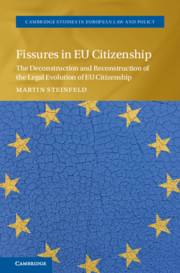 Fissures in EU Citizenship
Fissures in EU Citizenship Book contents
- Fissures in EU Citizenship
- Cambridge Studies in European Law and Policy
- Fissures in EU Citizenship
- Copyright page
- Epigraph
- Contents
- Acknowledgments
- Preface
- Introduction: Contaminated Citizenship
- Part I Fissures in the Foundations of the Temple
- 1 Is a ‘Worker’ Really a Worker?
- 2 The Role Explicitly Economically Inactive and Potentially Socially Excluded Categories of Individuals Played in the Subjective Creation of EU Citizenship
- Part II The Crumbling Pillars of the Temple
- Part III Could the Roof of the Temple Cave in?
- Bibliography
- Index
- Series page
1 - Is a ‘Worker’ Really a Worker?
A Discursive Assessment of the Substantive Evolution of the Concept of the ‘Community Worker’
from Part I - Fissures in the Foundations of the Temple
Published online by Cambridge University Press: 11 January 2022
- Fissures in EU Citizenship
- Cambridge Studies in European Law and Policy
- Fissures in EU Citizenship
- Copyright page
- Epigraph
- Contents
- Acknowledgments
- Preface
- Introduction: Contaminated Citizenship
- Part I Fissures in the Foundations of the Temple
- 1 Is a ‘Worker’ Really a Worker?
- 2 The Role Explicitly Economically Inactive and Potentially Socially Excluded Categories of Individuals Played in the Subjective Creation of EU Citizenship
- Part II The Crumbling Pillars of the Temple
- Part III Could the Roof of the Temple Cave in?
- Bibliography
- Index
- Series page
Summary
A fundamental tenet of Plender’s contention that the ‘incipient’ citizen can be seen to have emerged from the early case law on free movement is that the ‘worker’ can be construed as the early prototype of the citizen. This ties in particularly with the linkages made between market citizenship and EU Citizenship.1 The legal evolution of the ‘worker’ has arguably been the foundation stone of all free movement of persons law upon which the later temple of citizenship was built. This is particularly so as the concept of the ‘worker’ has been incorporated to include large parts of the law or, in the alternative, has been used as a counterpoint to either dovetail with or juxtapose against other aspects of free movement law (such as on establishment).
- Type
- Chapter
- Information
- Fissures in EU CitizenshipThe Deconstruction and Reconstruction of the Legal Evolution of EU Citizenship, pp. 39 - 99Publisher: Cambridge University PressPrint publication year: 2022
